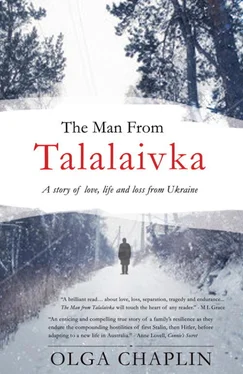He suddenly realised as he observed Anton that he, too, had been a similar age when he married his first love, Hanya. Without warning, tears smarted his eyes. He turned away and leaned against the cold steel rail, allowing the stinging sea spray to wash over him, as he searched for his pouch of tobacco. He forced himself to concentrate on his present surroundings, to remind himself of his and Evdokia’s good fortune. He could not allow himself, now, to think far back to those days of an earlier youthful married life. They were now in the middle of the Indian Ocean, somewhere between Africa and Asia, forging south-east towards another strange new continent at the opposite end of the globe from whence they came. In the vastness of the unfathomable ocean about them, and with no landmarks in sight these past days, there seemed to be a sense of unreality as daily he watched, mystified, as the deep emerald water changed to a liquid ebony with the disappearing sun.
He re-lit his rolled cigarette and licked at its bitter brown paper wrapping, all that remained in the ship’s cantina, and smiled as he remembered Evdokia’s triumph at her purchase of two small rugs from traders in the Suez Canal, in exchange for his cigarette carton that had been the captain’s gift upon embarkation. He leaned on the ship’s rail and pondered the events of these past weeks. The laden Castelbianco had an atmosphere of joviality as it left Naples, protected in the safety of the Mediterranean, taking on an almost carnival atmosphere during its slow passage through the Suez Canal, where traders from the exotic continent manoeuvred their bobbing boats and bargained trinkets and rugs with excited passengers on deck. Then their ship to freedom berthed at Aden, their last European port, for re-fuelling and being laden with crates of supplies. And now, as if in tune with the stiffening winds, after the earlier calm waters, the ship had cranked up its knots and forged ahead, determined to make up lost time.
The deck was now quiet, conviviality gone. His friends had packed away their chairs, left him to his reverie. Already the night was enfolding about him. He looked up in wonder, at a Higher Being performing its nightly alchemy magic. With each passing minute, the stars seemed to reach lower and lower towards the ship, as the inky sky darkened, soon to merge with the sea. He felt, in those moments, as if he could reach out and touch them, to catch their perennial spell, but resisted. He could just make out the large black-painted ′V′ on the ship’s funnel and marvelled at the ship’s new owner, Alexandre Vlasov who, it was rumoured, had also been a displaced person, somewhere in Europe. He shook his head in wonder. It took enterprise and courage, at war’s end, to so quickly gather such decommissioned troopships and place them at the behest of the International Relief Organisation, which was desperate for seaworthy vessels to transport displaced persons to all the continents of the globe. It also took courage, and generosity of heart, even if cased in pragmatism, for an Australian government and its people to open their doors to these strangers from a devastated continent.
Mykola’s blonde head was just visible in the ship’s muted light as he clung to the now wet rail. “Tato, Tato! Mama is already in the cafeteria queue!” Peter smiled, pleased that Mykola’s appetite had not waned on this voyage. He paused to look a last time at the ocean, which was now a murky black, with only slivers of refracted light streaking out a dubious path. Like a great sea creature, their black-hulled Castelbianco was now racing to join all those other great natural monsters of the antipodean oceans. He shivered as he made his way from the biting wind. He sensed that the next day’s equatorial celebrations, announced in admittedly intrusive spurts via a fractured public address system by well-meaning crew, would be a welcome distraction, and timely. Beyond that, there was no knowing how each passenger, each family, would fare for the remainder of their voyage.

Chapter 41
Asenior ship’s officer checked Mikhaelo’s documents and stamped them, then gestured him to the small group queuing at the gangway. Peter, standing nearby and distracted as he watched a flock of large white seabirds circling high above the bay, heard his name.
“Petro!” Mikhaelo hugged him, his natural reserve dissipating. “Petro… all these years, we have been like brothers… the camp… Naples… and now to leave like this…” He held back a sob as his Maria and little son joined him to farewell Peter and Evdokia. He leaned closer. “What can I do, Petro?” he whispered. “It is too risky… Even the ship’s doctor agreed we must disembark here… for them to recover.”
Peter’s chest tightened with emotion, the sun’s bursting rays and chatter of friendly workers dock-side giving little comfort at that moment. But he smiled and tried to reassure this gentle man. “Ah, Mikhaelo, my dear friend… we will meet again, one day… soon, God willing.” He lifted Ola to Mikhaelo, watched as godfather and goddaughter hugged their farewell. His lips quivered, bravado shielding his doubts. Their sea voyage had brought them to this port of Fremantle, already so far from Naples, from a Europe he could understand, yet still there were several more weeks of the voyage before them. His heart felt heavy as he thought of their past life and contemplated their future. He would be forever grateful for this passage to a safe country that was to become their home, but only fully realised now what a great distance, great expanse of ocean, separated them from their European heritage.
“Come now, Dyna… don’t cry!” He linked his arm through hers and waved as Mikhaelo and Maria stepped off the gangway onto their Western Australian soil. He sighed as he watched Ola as she played nearby with the other children, her hair white and curly like the foam tossed by the waves, her face no longer pale in the fierce sunlight. Yet already she was thinner, less steady than she had been at their Naples embarkation.
“Ha, Petro! There you are!” Semmen beamed as he stepped forward with an acquaintance from their dormitory. “We have such luck, here, with our friend Fedor! When he’s bored with playing his instrument,” he waved jokingly at the newcomer’s hand accordion, “he wants to make up our number at the cards!” He turned to Fedor, spurred him to play a few chords. “Kalika, Kalika, Kalika moya!” Semmen sang to the tune. Peter grinned and patted his shoulder. He, too, was a brother in life in the camp. Each understood the other’s heavy heart at Mikhaelo’s departure. Their jesting with their new partner at the card game, and distraction with the accordion, were but a camouflage for the uncertainties that befell them each new day.
He leaned at the deck rail, observing the spacious bushy surroundings of this busy western port; watched with interest as muscular wharf workers, arms browned in the burning southern sun, loaded boxes of foodstuffs and supplies onto wooden platforms that were swung dangerously from wharf to ship’s hold. The ship’s replenishments, activities, were at last completed, the cranes and gangway removed. The funnel, with its distinctive ′V′ glistening in the heat of the bay, blasted a final signal.
A sharp wind farewelled the Castelbianco as it churned its way westward out of the docks, as if intent on following the lustrous setting sun; then, like a magnet drawn to an inexplicable compass point, it made its surreptitious way southwards, to yet another zone of the antipodes.
* * *
A lone wolf howled, low, from far away, signalled its territorial dominance in the black of night. Peter stirred, felt for the straw that had been his makeshift bed in his parents’ Siberian camp hovel, blinking at sleep as he tried to locate their snow-covered window. The howl became a wrenching sob, unlike any he had previously heard. He raised himself on an elbow as he took stock of his surroundings. His Yosep and Palasha receded in the dream, the lone wolf no longer audible, the snow-trapped window but an illusory memory in the windowless dormitory.
Читать дальше













